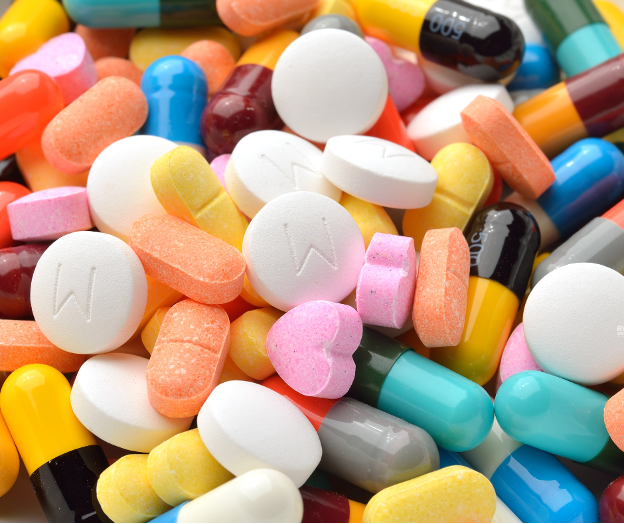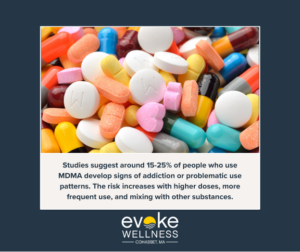You’re at a party when someone offers you a pill called Molly. Before you make a decision that could put your health at risk, educate yourself on what MDMA is and the dangers it poses.
MDMA, short for 3,4-methylenedioxymethamphetamine, is an illegal synthetic drug commonly referred to as Ecstasy or Molly. Its popularity surged in the 1980s as a party drug and again recently among teenagers and young adults. Don’t let its cute nicknames fool you – MDMA is extremely dangerous.
This article will provide key facts about MDMA, including:
- The short- and long-term effects it has on your brain and body
- Signs of MDMA addiction and how to get help
- Safely navigating parties and social situations where MDMA may be present
Equipped with information, you can make healthy choices and avoid the risks associated with MDMA and other illicit party drugs.
Together, let’s embrace the journey to recovery and the promise of a new beginning. Call us at (617) 917-3485 today or reach out online.
What Is MDMA?
The Party Drug’s Effects
MDMA, commonly known as ecstasy or molly, is a synthetic drug that alters mood and perception. As a stimulant and hallucinogen, it increases levels of neurotransmitters like dopamine, norepinephrine, and serotonin in the brain. This release of serotonin produces feelings of emotional closeness, empathy, and elevated mood.
Potential Risks & Consequences
However, MDMA use also raises heart rate, blood pressure, and body temperature – posing risks like panic attacks, anxiety, and depression. With repeated use, dependency and withdrawal symptoms like fatigue, irritability, and sleep issues can develop. Long-term MDMA abuse may lead to addiction and mental health issues and other detrimental effects.
How Does MDMA Work in the Brain?
Increasing Serotonin Levels
MDMA works by dramatically increasing the release of serotonin, dopamine and norepinephrine in the brain. Serotonin regulates mood, aggression, sexual desire, sleep and sensitivity to pain.
Flooding of Neurotransmitters
The drug causes a surge or “flooding” of these neurotransmitters in the brain. This overwhelming increase is what produces the emotional closeness, rush of energy and euphoria that users experience.
Short-Term Effects
In the short-term, MDMA can cause heightened energy, emotional warmth, empathy and distortions in sensory and time perception. However, the depletion of serotonin caused by frequent use can lead to negative effects like confusion, depression, sleep problems and anxiety.
Short-Term Effects of MDMA
Stimulating Rush
As MDMA (3,4-Methylenedioxymethamphetamine) enters your system, it artificially increases levels of serotonin, dopamine, and norepinephrine in the brain. This surge produces an energizing “rush” of euphoria, emotional warmth, and sensory enhancement within 45 minutes. Your heart rate and blood pressure spike as pleasure and energy levels soar.
Heightened Senses
During this high, which typically lasts 3-4 hours, you may experience heightened senses – colors appear brighter, sounds more vivid. Feelings of closeness and empathy are amplified. Some report reduced inhibitions and a sense of being “loved up.”
Comedown Period
However, as MDMA wears off after several hours, the comedown can be harsh. Commonly reported effects include fatigue, depression, attention deficits, insomnia, irritability, loss of appetite, and anxiety. This “crash” may persist for several days after use.
Is MDMA Addictive?
Physical & Psychological Dependence
MDMA does not cause the same intense physical cravings and withdrawal symptoms as drugs like heroin or alcohol. However, repeated use can lead to psychological dependence – feeling an urge to use MDMA despite negative consequences.
Addiction Potential
Addiction Warning Signs
- Using more MDMA than intended or for longer periods
- Failed attempts to cut down or control use
- Spending excessive time/resources obtaining and using MDMA
- Cravings or strong urges to use
- Continuing use despite negative consequences
While not as powerfully addictive as some drugs, MDMA does carry risks of dependence and addiction for some users. Seeking professional treatment can help overcome problematic use.
Health Risks and Dangers of MDMA
Negative Physical Effects
MDMA can cause muscle tension, nausea, blurred vision, and faintness. High doses increase risks of hyperthermia, seizures, and heart, liver, or kidney failure – potentially fatal.
Mental Health Impacts
MDMA may trigger panic attacks, psychosis, anxiety, depression, and confusion even weeks after use. Long-term effects could include memory problems and sleep disturbances.
Addiction Potential
Though considered less addictive than other drugs, MDMA can be psychologically addicting. Users may develop cravings and withdrawal symptoms like fatigue, depression, and trouble concentrating.
Getting Treatment for MDMA Addiction
Comprehensive Addiction Treatment
At Evoke Wellness, we understand the challenges of MDMA (ecstasy) addiction. Our evidence-based treatment approach combines drug and alcohol detox with intensive inpatient and outpatient programs tailored to your needs. Our solution-focused approach aims to help patients achieve long-lasting recovery.
Therapy for Lasting Change
- Cognitive Behavioral Therapy helps identify & change negative thought patterns
- Dialectical Behavior Therapy equips you with coping skills
- Individual therapy addresses personal struggles
- Group therapy provides support & accountability
Specialized Care
For those struggling with PTSD alongside substance abuse, our PTSD treatment program integrates trauma-focused therapies. This holistic approach supports healing from past traumas while overcoming addiction.
FAQs About MDMA
What is MDMA?
MDMA, or 3,4-methylenedioxymethamphetamine, is a synthetic psychoactive drug. Also known as ecstasy or molly, it produces euphoric and empathogenic effects by increasing serotonin, dopamine, and norepinephrine activity in the brain. According to Stanford’s Human-Centered AI group, MDMA was originally developed as a psychiatric medication in the 1960s before becoming popular recreationally.
Is MDMA addictive?
Yes, MDMA is highly addictive due to its effects on the brain’s reward system. As stated on Evoke Wellness at Cohasset’s blog, continued use can lead to the reward center becoming less responsive, reducing the ability to feel pleasure without the drug. Long-term abuse increases the risk of accidental overdose, especially when mixed with other substances like fentanyl.
What are MDMA withdrawal symptoms?
Withdrawal symptoms from long-term MDMA use include fatigue, depression, anxiety, irritability, insomnia, decreased appetite, paranoia, confusion, panic attacks, and hallucinations. These are caused by disruptions in serotonin production due to chronic MDMA exposure, which can persist even after stopping use and lead to serious depression.
Conclusion
You now have a better understanding of what MDMA is and the effects it can have. While it may seem harmless or fun, abusing this drug is dangerous and can lead to long-term health issues. There are many treatment options available if you or a loved one is struggling with MDMA addiction, such as detox, inpatient rehab, therapy programs, and group support. Recovery is possible with the right help. Focus on self-care, set healthy boundaries, and surround yourself with positive people. Your health and wellbeing should always come first. There are people who care and want to see you thrive. Don’t be afraid to take the first step and seek treatment if MDMA has taken over your life. A happier and healthier future awaits.
Begin Your Journey with Evoke Wellness at Cohasset
If you or a loved one is considering treatment, Evoke Wellness at Cohasset invites you to contact us. Our compassionate team is ready to answer your questions, discuss your needs, and help you take the first steps toward recovery. In Cohasset, you’ll find more than just a treatment program – you’ll discover a community dedicated to your wellness and success. Together, let’s embrace the journey to recovery and the promise of a new beginning. Call us at (617) 917-3485 today or reach out online.





